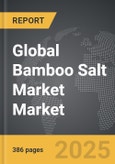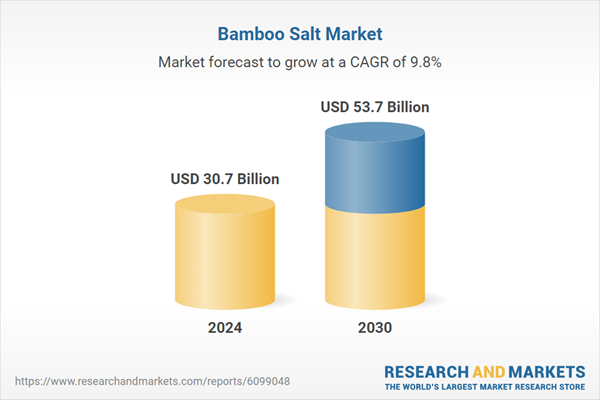Global Bamboo Salt Market - Key Trends & Drivers Summarized
Why Is Bamboo Salt Gaining Recognition as a Functional Wellness Ingredient and Traditional Healing Supplement?
Bamboo salt, a traditional Korean remedy made by roasting sea salt in bamboo stalks sealed with mineral-rich yellow clay, is gaining global attention for its purported detoxifying, anti-inflammatory, and alkalizing properties. The high-temperature roasting process (repeated up to nine times in some grades) alters the chemical composition of the salt, significantly reducing impurities and infusing it with trace minerals like potassium, calcium, iron, and magnesium. This process results in a product with a higher pH and unique taste profile, positioning bamboo salt as both a premium culinary ingredient and a functional supplement in health-conscious markets.As consumers increasingly seek natural, minimally processed alternatives to conventional table salt, bamboo salt is being embraced not only for its distinctive flavor but also for its association with traditional medicine, oral care, digestive balance, and immune support. Its historical use in Korean medicine to support gastrointestinal, oral, and skin health is now being validated by wellness enthusiasts and holistic practitioners worldwide, fueling its rise in alternative health, natural food, and nutraceutical categories.
How Are Processing Traditions, Nutrient Density, and Product Diversification Driving Market Appeal?
The artisanal manufacturing of bamboo salt is central to its value proposition, with quality and pricing largely determined by the number of roasting cycles - each intended to further purify and concentrate beneficial minerals. Triple-roasted and nine-times-roasted varieties are especially sought after for therapeutic use and premium culinary applications. This intensive production method also enhances the salt's alkaline nature and solubility, contributing to its use in functional formulations such as detox teas, toothpaste, skin scrubs, and oral rinses.Product diversification is expanding its reach into both food and wellness markets. Bamboo salt is now being incorporated into gourmet seasonings, alkaline water enhancers, mineral supplements, and topical personal care formulations. Packaged in fine powder, granules, and lozenge formats, it is increasingly marketed for specific use cases - ranging from internal detox and acid-base balance to mouth ulcer relief and skin soothing. Premium packaging, origin-based branding, and third-party mineral analysis are reinforcing its positioning as a wellness-forward mineral salt.
Where Is Demand for Bamboo Salt Growing and Which Consumer Segments Are Leading Adoption?
Demand for bamboo salt is growing in health-conscious consumer markets across Asia-Pacific, North America, and parts of Europe. South Korea remains the primary production and consumption hub, with Japan, China, and Taiwan representing expanding regional markets. In Western countries, the product is gaining traction in holistic health circles, natural food stores, wellness e-commerce platforms, and among integrative medicine practitioners recommending it for digestive health and systemic alkalization.The primary consumer base includes wellness-focused individuals, clean-label product adopters, and alternative health enthusiasts seeking mineral-rich, therapeutic alternatives to processed salts. The functional nutrition segment - particularly those following alkaline diets, detox protocols, or anti-inflammatory regimens - is driving uptake. Bamboo salt is also finding niche popularity among vegans, endurance athletes, and skincare consumers interested in its oral, dermal, and systemic applications.
What Is Fueling the Global Growth of the Bamboo Salt Market?
The global growth of the bamboo salt market is fueled by rising consumer interest in ancient healing systems, functional ingredients, and natural mineral supplementation. As salt consumption becomes more scrutinized for its health impact, bamboo salt's dual positioning as a clean, alkaline, and trace-mineral-rich alternative is gaining relevance. Additionally, growing distrust of industrial food additives and rising demand for traditional, slow-crafted remedies are encouraging premiumization within the salt category.E-commerce and health-focused digital platforms are expanding accessibility and awareness, supported by content marketing around its origins, benefits, and differentiators versus conventional and Himalayan salts. Innovation in wellness formats and cross-category applications - from food to personal care - is opening new retail channels and consumer touchpoints. As global consumers increasingly seek nutritional enhancement through heritage ingredients, a defining question emerges: Can bamboo salt evolve from a niche traditional remedy into a mainstream functional wellness ingredient without compromising its artisanal integrity and therapeutic value proposition?
Report Scope
The report analyzes the Bamboo Salt market, presented in terms of market value (US$). The analysis covers the key segments and geographic regions outlined below:- Segments: Type (Food Grade, Pharmaceutical Grade, Other Types); Application (Food, Pharmaceutical, Personal Care, Agriculture, Home Care, Other Applications); Distribution Channel (Online, Offline).
- Geographic Regions/Countries: World; United States; Canada; Japan; China; Europe (France; Germany; Italy; United Kingdom; Spain; Russia; and Rest of Europe); Asia-Pacific (Australia; India; South Korea; and Rest of Asia-Pacific); Latin America (Argentina; Brazil; Mexico; and Rest of Latin America); Middle East (Iran; Israel; Saudi Arabia; United Arab Emirates; and Rest of Middle East); and Africa.
Key Insights:
- Market Growth: Understand the significant growth trajectory of the Food Grade Bamboo Salt segment, which is expected to reach US$36.2 Billion by 2030 with a CAGR of a 10.4%. The Pharmaceutical Grade Bamboo Salt segment is also set to grow at 8% CAGR over the analysis period.
- Regional Analysis: Gain insights into the U.S. market, valued at $8.4 Billion in 2024, and China, forecasted to grow at an impressive 13.5% CAGR to reach $11 Billion by 2030. Discover growth trends in other key regions, including Japan, Canada, Germany, and the Asia-Pacific.
Why You Should Buy This Report:
- Detailed Market Analysis: Access a thorough analysis of the Global Bamboo Salt Market, covering all major geographic regions and market segments.
- Competitive Insights: Get an overview of the competitive landscape, including the market presence of major players across different geographies.
- Future Trends and Drivers: Understand the key trends and drivers shaping the future of the Global Bamboo Salt Market.
- Actionable Insights: Benefit from actionable insights that can help you identify new revenue opportunities and make strategic business decisions.
Key Questions Answered:
- How is the Global Bamboo Salt Market expected to evolve by 2030?
- What are the main drivers and restraints affecting the market?
- Which market segments will grow the most over the forecast period?
- How will market shares for different regions and segments change by 2030?
- Who are the leading players in the market, and what are their prospects?
Report Features:
- Comprehensive Market Data: Independent analysis of annual sales and market forecasts in US$ Million from 2024 to 2030.
- In-Depth Regional Analysis: Detailed insights into key markets, including the U.S., China, Japan, Canada, Europe, Asia-Pacific, Latin America, Middle East, and Africa.
- Company Profiles: Coverage of players such as Advantage Fibres International Ltd., All American Clothing Co., BAM Bamboo Clothing Ltd., Bamboosa, Boody and more.
- Complimentary Updates: Receive free report updates for one year to keep you informed of the latest market developments.
Some of the 47 companies featured in this Bamboo Salt market report include:
- Artisan Bamboo Salt
- Bamboo Salterra
- Bambu® Salz
- Bharat Global Shipping
- Blak Spear Enterprise Private Limited
- CHEN SHIN FOOD FACTORY CO., LTD.
- CUNRONG TECHNICAL INC.
- Dabyut Food
- Dohae Bamboo Salt
- Gondwana Global Mercantile Pvt Ltd
- GOODY FOOD ESTABLISHED CO., LTD.
- Impex Enterprises
- Insan Bamboo Salt Co., Ltd.
- Insanga Co., Ltd.
- K Healing
- Kisoondo Bamboo Salt
- K-Lava Salt
- KOREASALT Co., Ltd.
- Kwellbeing Inc.
- Ocksujung Bamboo Salt
This edition integrates the latest global trade and economic shifts into comprehensive market analysis. Key updates include:
- Tariff and Trade Impact: Insights into global tariff negotiations across 180+ countries, with analysis of supply chain turbulence, sourcing disruptions, and geographic realignment. Special focus on 2025 as a pivotal year for trade tensions, including updated perspectives on the Trump-era tariffs.
- Adjusted Forecasts and Analytics: Revised global and regional market forecasts through 2030, incorporating tariff effects, economic uncertainty, and structural changes in globalization. Includes historical analysis from 2015 to 2023.
- Strategic Market Dynamics: Evaluation of revised market prospects, regional outlooks, and key economic indicators such as population and urbanization trends.
- Innovation & Technology Trends: Latest developments in product and process innovation, emerging technologies, and key industry drivers shaping the competitive landscape.
- Competitive Intelligence: Updated global market share estimates for 2025, competitive positioning of major players (Strong/Active/Niche/Trivial), and refined focus on leading global brands and core players.
- Expert Insight & Commentary: Strategic analysis from economists, trade experts, and domain specialists to contextualize market shifts and identify emerging opportunities.
Table of Contents
Companies Mentioned (Partial List)
A selection of companies mentioned in this report includes, but is not limited to:
- Artisan Bamboo Salt
- Bamboo Salterra
- Bambu® Salz
- Bharat Global Shipping
- Blak Spear Enterprise Private Limited
- CHEN SHIN FOOD FACTORY CO., LTD.
- CUNRONG TECHNICAL INC.
- Dabyut Food
- Dohae Bamboo Salt
- Gondwana Global Mercantile Pvt Ltd
- GOODY FOOD ESTABLISHED CO., LTD.
- Impex Enterprises
- Insan Bamboo Salt Co., Ltd.
- Insanga Co., Ltd.
- K Healing
- Kisoondo Bamboo Salt
- K-Lava Salt
- KOREASALT Co., Ltd.
- Kwellbeing Inc.
- Ocksujung Bamboo Salt
Table Information
| Report Attribute | Details |
|---|---|
| No. of Pages | 386 |
| Published | February 2026 |
| Forecast Period | 2024 - 2030 |
| Estimated Market Value ( USD | $ 30.7 Billion |
| Forecasted Market Value ( USD | $ 53.7 Billion |
| Compound Annual Growth Rate | 9.8% |
| Regions Covered | Global |









